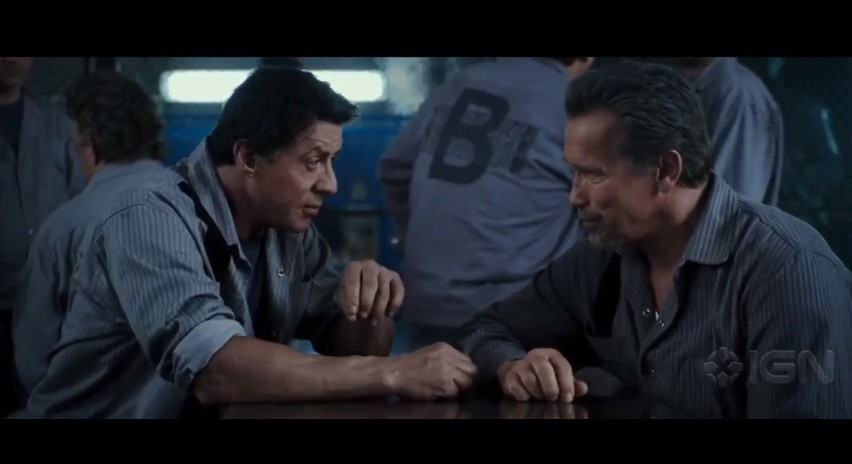A Christian Review Of The Motion Picture Escape Plan
In the opening scene of Escape Plan—starring Sylvester Stallone, Arnold Schwarzenegger, and Jim Caviezel—a world-weary prisoner named Ray Breslin (Stallone) sits in a lonely cell with a Bible in his hands. For a brief moment, the camera lingers over the page, and we see Jeremiah 15:6: “Thou hast forsaken me, saith the Lord, thou art gone backward: therefore will I stretch out my hand against thee, and destroy thee; I am weary with repenting.”
It is an appropriate verse, not only because it fits the gloomy, condemning setting of a maximum-security prison, but also because it provides potent foreshadowing.
Stallone plays a somber, melancholic character that has a, well, interesting job, to say the least: he has himself inserted into maximum-security federal prisons as a prisoner and escapes from them to test their strengths and weaknesses. He never fails to escape, and the government pays him big bucks to provide foolproof security assessments. However, when the most dangerous job of his career takes a turn for the worse, he finds himself cut off from his security firm that remotely monitors his progress in prison, and he is locked away in the most brutal, secure and secretive prison in the world: a place called The Tomb. Breslin must seek help from the inside to find out who is behind his predicament and, if he dares, attempt an escape.
The film adds another superb effort to the much hallowed prison escape genre, which began centuries ago with the literary classic Count of Monte Cristo and has had a wide variety of incarnations in cinema—most notably films like Shawshank Redemption and, with its funny animated twist, Toy Story 3.
Unlike any other movie in its genre, however, Escape Plan has a serious dose of ’80s action adrenaline, and Stallone’s character takes no prisoners. Perhaps as a visual allusion to Jeremiah 15:6 and God’s judgment against the wicked, Breslin is more than willing to destroy those who have committed terrible injustices against him.
And he is not alone.
For the first time on-screen, Sylvester Stallone and Arnold Schwarzenegger share the spotlight of an epic action movie. Of course, Schwarzenegger starred in Stallone’s The Expendables films, but they were minor roles compared to Escape Plan, which sees Schwarzenegger return to the gargantuan action profile that made him famous—complete with spaghetti western slow-motion close-ups, impossibly giant machine guns, and one-liners that drew laughter from the entire theater: “You hit like a vegetarian.”
The film also sees Jim Caviezel (The Passion of the Christ) as a surprisingly insidious villain, rapper 50 Cent as a convincing cyber-geek hacker, and Schwarzenegger displaying brilliant acting chops while performing an entire scene—which includes a manic, jaw-dropping recitation of the Lord’s Prayer—in his fluent German, the language he learned before English. We stereotype Schwarzenegger as a limited actor because of his one-liners and muscle man roles; however, seeing him in a lengthy scene scripted entirely in German convinced me that he would probably win a few Oscars if he starred in all German-language films.
Besides great acting from the marquee names, the film features top-notch performances from a large cast of notable stars: Faran Tahir (Iron Man), Amy Ryan (The Office, Gone Baby Gone), Sam Neill (Jurassic Park), Vincent D’Onofrio (Law & Order: Criminal Intent), and Vinnie Jones (Snatch). Swedish director Mikael Håfström (1408, The Rite) helmed the movie with a screenplay from Jason Keller (Mirror Mirror, Machine Gun Preacher) and Miles Chapman.
As an action thriller, Stallone and Schwarzenegger offer up their very best. Besides big-budget, brilliantly timed action scenes, the movie does a good job of making you feel the locked-in claustrophobia of a high-security prison—but with occasional refreshing reprieves in open air scenes. It is smartly written, and it contains fast-paced, detail-oriented plot pacing that has plenty of unexpected twists and turns.
It is an R-rated film, and it earns the rating with language and violence. Thankfully, it does not have any sex scenes or nudity—although there is one very crude, graphic joke. However, as you might expect in a movie filled with angry, gritty prisoners, most sentences are peppered with an f-word. I quickly lost count, and it felt unnecessary, as if the writers were instinctively throwing in f-words whenever they needed to highlight emotional intensity. Also, the violence can be graphically depicted and bloody at times: for example, it shows in lurid cringe-worthy detail a doctor sewing up Breslin’s leg wound. However, when you look at what many R-rated movies get away with these days—especially horror films, war movies, or Tarantino features—it was milder in comparison.
While this movie was certainly not made with a Christian family in mind, and while the material above might rule out the film for many readers, a review of a Stallone film cannot be written without mentioning his Christian faith, which he has expressed more openly since Rocky Balboa. Although Stallone had no part in directing, writing, or producing the film, I suspect that his star power allowed him some influence over the content. Besides the Scriptural references throughout the film, there are other redemptive elements in the story: several characters sacrifice themselves to save others, some turn away from wickedness and obey their consciences, and there is an intense love for family depicted throughout. The heart of the story sees a father who is willing to do anything to be reunited with his daughter. And, if you look carefully enough, there are even small shadows of a Christ-figure in Stallone’s character, as he willingly subjects himself to imprisonment and punishment even though he is an innocent man.
To get to these redemptive elements, however, the moviegoer will have to wade through a wide river of R-rated expletives and violence. For many Christians, especially those who are not rabid action thriller fans, this will be a movie they skip. For addicts of prison escape movies, however, it might be too hard to resist.


